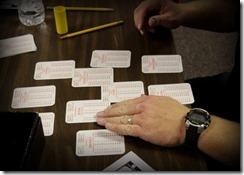I was reading one of Tom’s Monster Monday articles lately and although I had probably not given it much thought he would take a player with an 11-5, 33-6, 66-1 and read it as 1-5-6. Where I grew up and learned the game it was 5-6-1. I have been on the APBA site and seen several variations on players who have 4 or more “power numbers.”
So I started reading other articles and blog sites from various APBA players and realized that just like if you travel to certain parts of the country the accent or phrases for everyday life vary, so does the lingo in APBA.
The person who taught me the game was from the Detroit area, so Shawn will have to let us all know if any of this was “local speak” or not. So some of the things we called things were if you hit a 0, it was “extra bases.” Never mind that there are tons of 11’s 7’s and even some 8’s in the dead ball era cards, but I still use the phrase to this day.
We referred to any of the numbers such as 11, 22, 33, etc. as the “double numbers”; and single column cards were “power hitters” despite the number of weak hitters who got single column cards, especially J-4 pitchers. When any pitcher had an X or XY we called them “power pitchers.”
I eventually began to be a solo player only. I rarely play heads up any more due to my current obligations. I have started to say when a B pitcher gets a hitter out with an 8 result that he “fooled him” or if it’s a pitcher with a known specialty pitch he used that to get the hitter out. When a pitcher gets a 9 that ends up with a strikeout he “overpowered him” and when a player has only 1 way to hit a home run and gets it I call it a “lottery roll” And of course any roll that brought out a 37, 41, etc. was a "chart number", because we usually had to go to the charts to find out what just happened.
So I am curious to know if there are any readers across the country that have noticed any “local slang” when it comes to the great game of APBA baseball?





If it’s a hit:
A “7” – “That is a rope thru the infield”
An “8” – “A bloop hit drops in”
A “9” – “A bleeder just makes it thru”
65-35: “He just missed it”
You just want the “repeatable in polite company” ones, right?
66=Boxcars. 11=Snake Eyes. 33=Turtles.
I just remembered one that I use a lot. If a player gets a hit off a 53-15, 16, or 17 I call it a “cheap hit”.
I know that’s unfair to a lot of hitters as usually that is APBA’s way of rewarding great hitters such as George Brett, Ichiro, or Fred Clarke by getting that extra “hit number”, but I cannot count the number of times a pitcher will have a no hitter going late in the game and that was the first or only hit of the game.
Our “local slang” was pretty much just used among those in our six-man draft league back in the day. It was, I suppose, something of a missed opportunity that our high school had two distinct “APBA cliques” among the students as well as a group of teachers who played; unfortunately, none of us reached out to the others back then; it could have made for some interesting cross-pollination. As it was, there were some colorful terms that evolved among our little group:
11, 33 and 66 were the “payoff numbers”, and we read them in that order; a player with 1-4-5-6 power “paid off 4-5-1 with a 6 kicker”. 0-0-0 or 1-1-1 were “straight zeros” or “straight ones”.
Dice rolls 15 and 25 were the “speed numbers”.
Play results 23 and 36-41 were the “zonks” (Let’s Make a Deal fans will understand).
Slow runners were “pigs” and the “play safe” option was “chaining that pig to the bag”,
Dice roll 53 was known as a “dumb roll”, and was something of a product of evolution, as it were. We used to call “drum roll, please” before we would roll the dice in a clutch situation. This evolved into “dumb roll, please”…and, on one occasion where a call of “dumb roll, please” generated a particularly obnoxious error play from a roll of 53, we came to realize what a true “dumb roll” really was.
Sure do miss the old days…
there are some good ones there, Mike.
Our league has a few (honestly I’m not sure if they are unique to our league or not):
– if we get a 0 and get to roll on the second column, it’s a “rip” or we say “he ripped it”
– any unusual play number (36-41 and 23) are “funny” numbers
– if we roll a 16 or 61, we “split ’em up” ie rolled one 6 and one 1 but not both at the same time
Great idea for an article, Scott!
In our MN 8 team league in the 80s there was big demand for the 1 at 66, vs those hitters who had a 0 at 66 and risked seeing their 66 role end up a double or a hit less than a homer. So we called a 1, especially on dbl column cards, an “automatic”.